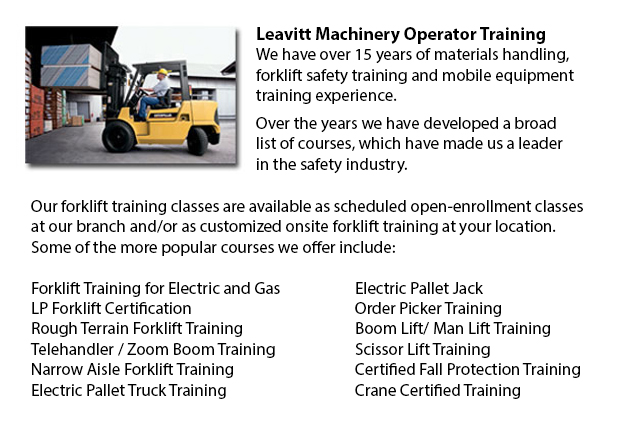
Langley Forklift Certification Schools - In North America, forklift certification is mandatory, making forklift training programs necessary for both the business and their workers working as forklift operators. Forklift training focuses on safety and health issues involved in forklift operation. Safety concerns affect both the driver of the forklift and employees and other individuals who are in close proximity to the forklift. Companies can be subject to penalties if they are caught with drivers who are un-certified during an inspection. There are many convincing reasons why businesses have to comply with forklift standards.
Before the worker or trainee is certified to drive a forklift, the majority of state, provincial and federal regulations will need the employee go through an evaluation of the skills essential for forklift safety. There are various forklift certification schools providing courses for employees and there are likewise schools which provide on line forklift training. Then again, employers should be aware that forklift certification training is not "just a test". Correct forklift training must contain various areas of study, including theory and hands-on practice. Rules do not need employers to have an outside organization to certify forklift operators.
The recommended curriculum for a quality forklift certification service involves both an onsite component and classroom training. Classroom training usually features informative sessions with power point presentations, videos, models and discussions. Students typically are required to write a test to check for understanding of subject matter. Certificates of completion are given upon successful completion of the class.
An evaluation of the student's use of the equipment consists of knowledge of job site hazards, pre-operational equipment inspection, operational instruction and a pass/fail operational test.
Training normally comprises the following subject areas: Controls & Instrumentations; Understanding legislations and regulations; Engine maintenance and Operation; maneuvering and Steering; Fork and Attachment Limitations, Visibility; Rated Capacities, Stability, Maintenance & Inspection; Refueling; Load Control; Hazardous Places & Rough Terrain Operations and Pedestrians. There are also training courses offered for employees who are transitioning to new job positions.
-
Operator Safety Certification | Re-Qualification Certification | In-House Instructor Certification in Langley
Lift trucks are utilized in nearly all warehouse operations and in boat yards and in industrial construction sites. The reach feature of a forklift is a vital component used in several applications like for example whenever a shelving system is being... More -
Skid Steer Loader Certification in Langley
The engine powered skid-steer loader consists of a small and rigid frame, equipped along with lift arms that could connect to numerous industrial attachments and tools to carry out several labor saving jobs. Normally, skid-steer loaders are four-whee... More -
Langley Forklift Training Classes
Langley Forklift Training Classes - Forklift are heavy pieces of industrial machines that are utilized in transporting and the handling of merchandise and materials. They are often known as Lift trucks and are found in all kinds of industries. Employ... More -
Langley Heavy Equipment Operator Certification
Langley Heavy Equipment Operator Certification - The heavy equipment operator is an individual who manipulates the controls and drives various kinds of big machinery. Heavy machines is most commonly used on construction sites in order to deliver supp... More -
Langley Crane License
Langley Crane License - Crane operators ought to be "credentialed", which means they ought to own a crane operator license or certification. Credentialing is considered a mandatory governmental prerequisite to be able to practice as a crane operator.... More -
Langley Forklift Training School
Langley Forklift Training School - Forklift Training School And What It Truly Has To Provide - Industry and federal regulators have established the criteria for forklift safety training according to their current standards and regulations. People wis... More -
Langley Boom Lift Certification
Langley Boom Lift Certification - Elevated work platforms allow maintenance operations and work to be performed at heights that can not be reached by whichever other way. Workers utilizing boom lifts and scissor lifts could learn how to safely operat... More -
Langley Manlift Safety Training
Langley Manlift Safety Training - Manlift operators need to be cognizant and aware of all the potential dangers which are connected with specific classes of scissor lifts. They have to be able to operate the scissor lift in a way that protects not on... More

Forklift Certification Langley
TOLL FREE: 1-888-254-6157
Langley, British Columbia
forkliftcertificationlangley.com
Email Us
About Us


